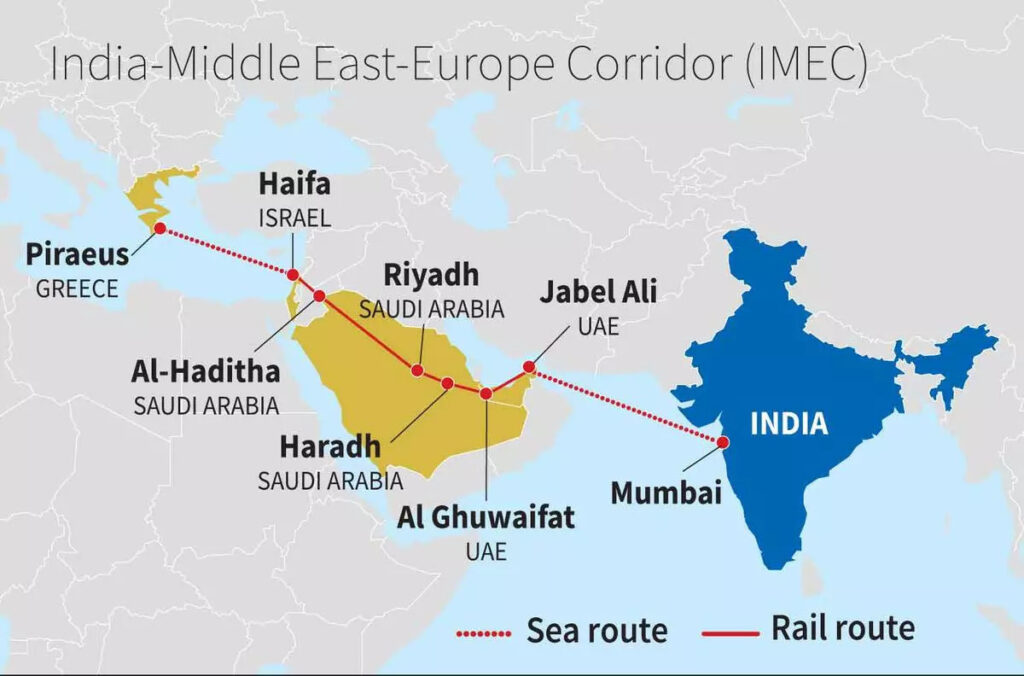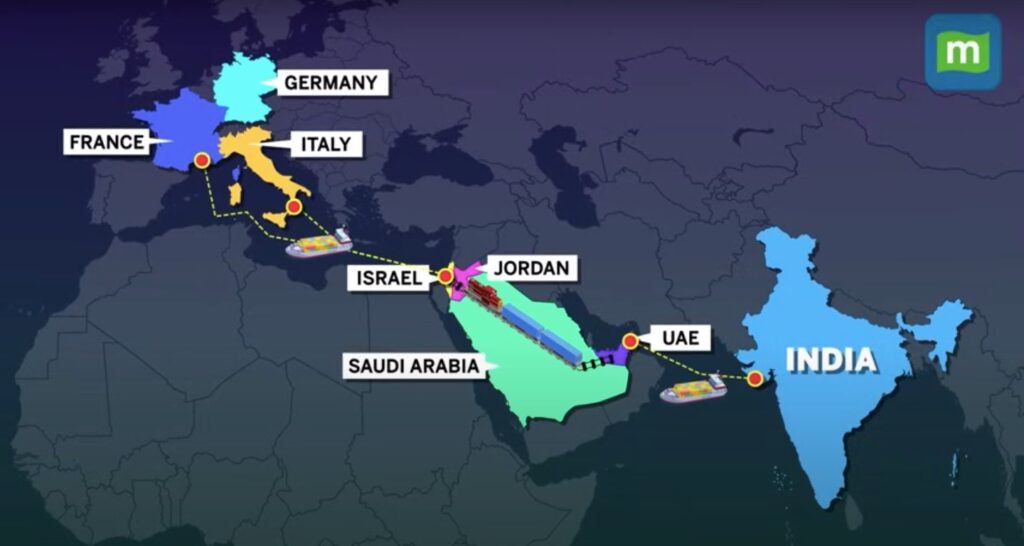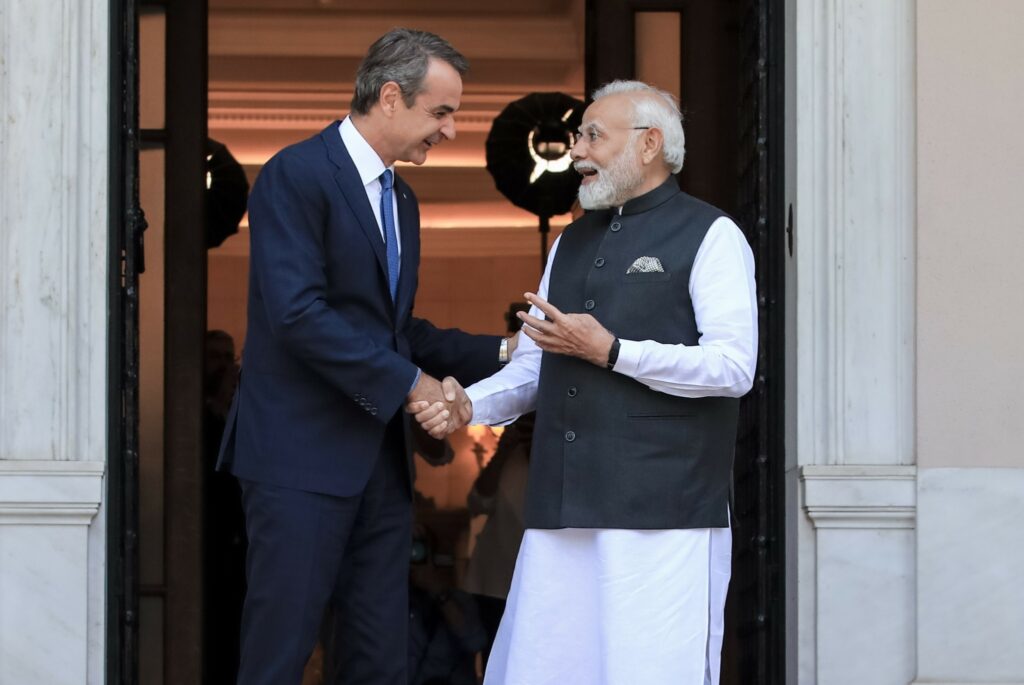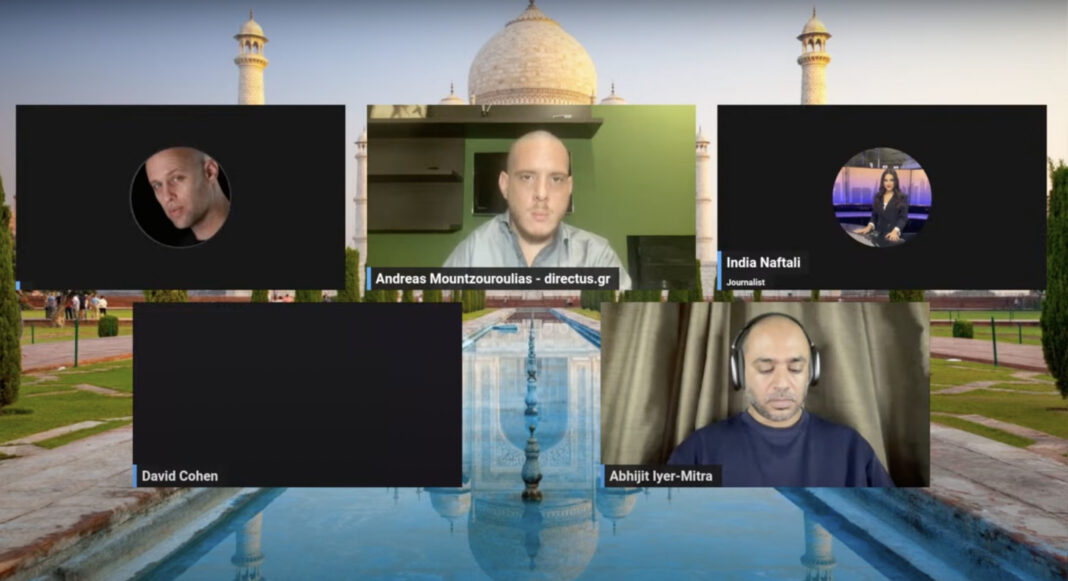The Director of Directus.gr, Andreas Mountzouroulias, spoke about Greece-India relations, and about the new great Corridor India – Middle East – Europe – IMEC and mentioned the opportunities for Greece.
The interview is in English. The panel included an Indian interlocutor and a journalist from Israel.
Watch video:
Highlights:
US President Joe Biden with the leaders of India, Saudi Arabia and the United Arab Emirates announced last Saturday, within the framework of the Summit of the influential G20 group in New Delhi, the new trade road trade road that will connect India, through Middle East, with Europe through a network of railways and ports. The president of the Commission, Ursula von der Leyen, for her part, described the project as a “green and digital corridor between continents and cultures”. As Europe seeks to reduce its exposure to Chinese investment, analysts are speaking bluntly of an attempt to discredit China’s “One Belt, One Road” trade – and investment – corridor. After all, the design of the so-called IMEC, through railway networks and through the sea route, is strongly reminiscent of what was formerly known as China’s “New Silk Road” (BRI).
What exactly does the IMEC plan provide? The information that has come to light gives some clues about trade routes, with other scenarios seeing the trade corridor to Europe passing through the port of Piraeus.

During the G20 meeting, a memorandum of understanding on IMEC (from the English initials of the words: India, Middle East and European – Economic – Corridor) was signed between the parties supporting the agreement, namely the US, India, S .Arabia, United Arab Emirates (UAE), France, Germany, Italy and the European Union.
It is obvious that this plan will essentially be the rival of the Chinese corridor “One Belt one Road” and for that reason it has the absolute support of the USA. It is no coincidence that preliminary talks on the announcement of the MOU on the sidelines of the G20 began two years ago and culminated in May in Jeddah with talks between the heads of the National Security Advisers of the US T. Sullivan, India A. Doval and the UAE T .Bin Zayed Al Nahyan under the patronage of Saudi Prince MBS.
For India, IMEC is of great strategic and economic importance as it seeks direct connectivity routes to the Middle East and Europe so that it can directly compete with its major regional rival, China, while overcoming Pakistan’s connectivity barriers. to the West but also the lack of reliability of the other land corridor through Iran.
For Greece it is now a strategically important pursuit to ensure that it becomes part of this Corridor in its final route from Haifa to Europe as this will not only have a strategic surplus value but also a huge economic importance for the country.
The Irritation of Turkey and the Doctrine of India
The President of Turkey, Recep Tayyip Erdogan, has already openly expressed his dissatisfaction with the exclusion of Turkey from the trade corridor, stressing that “there can be no trade corridor without Turkey. Turkey is an important manufacturing and trading base. The most convenient route for traffic from East to West must pass through Turkey.”
India’s path to the Mediterranean countries opened after the normalization of the UAE with Israel and the formation of the I2U2 (India-Israel-US-UAE) economic bloc. This means India could send the goods to either UAE ports or the Adani-owned Haifa port in Israel, from where they can go to the Piraeus transshipment complex.
India, for its part, firmly supports Greece in its conflict with Turkey over Cyprus.
Defense cooperation is steadily increasing. Greek fighter jets are expected to participate in the Tarang Shakti exercise for the first time in September.
A highlight of this relationship was the close cooperation of the armed forces of the two countries, with the participation of the Indian Air Force for the first time in the multinational exercise “HNIOHOS 23” held at the end of May 2022.

The warship INS Chennai of the Indian Navy also visited Souda Bay in Crete from July 27-29 and conducted a transit exercise with the warship Nikiforos Fokas in the Aegean Sea.
Relations between India and Greece have been steadily expanding in recent years. In 2020, the two countries signed a Strategic Partnership Agreement, resulting in enhanced defense, trade and energy cooperation.
India is also strengthening its military ties with Greece.
In addition, India is trying to strengthen its trade and investment relations with this region.
In a recent interview with WION on August 24, Greek Foreign Minister Giorgos Gerapetritis said that Greece, with the port of Piraeus on the Aegean Sea, has the potential to serve as India’s gateway to Europe.
For Modi’s visit to Greece
The first visit of an Indian Prime Minister to Greece in the last 40 years took place a few weeks ago, with the economy dominating the agenda. What is pointed out by government sources is that the arrival of Narendra Modi signals the will of both sides to restart and expand relations between them and consolidate economic cooperation at the highest level.

In the economic field, it is estimated that there may be a greater presence of Indian groups in Greece, especially in the sectors of infrastructure, high technology, renewable energy sources, tourism.
The Indian Prime Minister’s visit to Greece is part of India’s growing engagements with Mediterranean countries in a wide range of sectors, including security and defence.
For China-Pakistan-Turkey
In Greece, the Chinese are buying everything, They are now in for good and this must stop. Erdogan plays China’s games in the Mediterranean. At the same time, we have Pakistan-Turkey intelligence cooperation. At the same time, Turkey sends immigrants, mainly Pakistanis, to Greece.
Meanwhile, the Pakistanis constantly provoke on Greek soil with marches, mainly against India!

